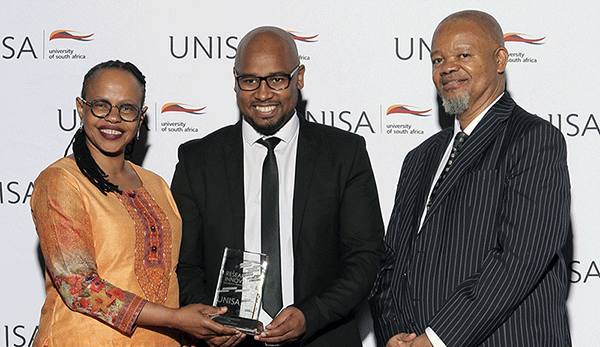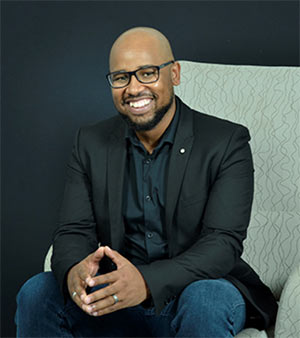
Prof Lindelani Mnguni, Chair of the Department of Science and Technology Education in Unisa’s College of Education (CEDU), and a National Research Foundation (NRF) C2-rated researcher, could not cease extolling the institution’s commitment to supporting the development of young academics in the context of transformation. He says his rating is a reflection of Unisa’s potential and of the potential of black academics, in particular. Mnguni has always believed that when the playing ground is level, there is so much more that young African scholars can achieve, and his rating is testament to that.

Prof Thenjiwe Meyiwa (Vice-Principal: Research, Postgraduate Studies, Innovation and Commercialisation) and Prof Mandla Makhanya (Principal and Vice-Chancellor) congratulate Prof Lindelani Mnguni (CEDU) (centre) on his 2020 NRF C2 rating.
From a rural school to obtaining a PhD and having lectured at different institutions, Mnguni’s interest lies in matters related to Life Sciences education. His previous research showed, for example, that aspects of HIV/AIDS knowledge taught in the school subject Life Sciences were not context specific enough for learners to be able to apply these in their everyday life, which raised the question of how the science curriculum could be aligned with daily living. Meanwhile, his current research deals with the use of visual models to teach scientific phenomena that exist at molecular level, and therefore not visible to the naked eye.

Prof Lindelani Mnguni (CoD: Science and Technology Education, CEDU) is a newly rated NRF C2 researcher.
"I am interested in strategies to use visual models to support learning and the impact of science on everyday life. This is important in the era of the Fourth Industrial Revolution (4IR) and online learning, where students have to rely on computerised and digital learning resources. My research team is, therefore, attempting to explore strategies to support students in this regard. Specifically, we are attempting to understand the cognitive visuo-semiotic reasoning processes in life sciences education."
Expanding on his rating, Mnguni reiterated that it says a great deal about the type of people with whom he has been fortunate to work. He appreciates, among others, his supervisors and those Unisa academics who supported him from his undergraduate studies to PhD, as well as those with whom he has worked, both as collaborators and as students he has supervised, not just at Unisa, but across the different institutions where he has worked.
Mnguni anticipates that the rating will help him attract more resources to enhance the quality of his research, making it impactful and globally recognised. He added that, since Unisa is a university in Africa, he believes that the academics of this institution have much teach the world. However, academics need resources to do ground-breaking research. He strongly believes that his recognition is a significant step in that direction.
According to Mnguni, given his socio-economic background, the rating is also testament to what can be achieved in South Africa when resources are well allocated. For his undergraduate studies, he was funded by the National Student Financial Aid Scheme (NSFAS), and the NRF paid for his postgraduate studies. Therefore, the rating is a return on all of the investments that the government made through NSFAS and the NRF. He is convinced that if more resources were provided to South African students, the country would produce some of the best researchers in the world.
Mnguni believes that research should not be "a job" but a hobby and passion. "A job is done from 08:00 to 16:00, but research is done 24 hours a day and 365 days a year. As a result, you have to find something you will really be passionate about, something that will keep you awake through the night. I imagine late prominent researchers like Prof Albert Einstein and Sir Isaac Newton, and read about them. They were driven by passion and wanted to find answers. I think we should adopt the same attitude."
"I encourage colleagues to be a little bit bold. There are many Unisans who could be rated and receive research funding, if only they would apply. I would really encourage them not to disqualify themselves. Colleagues should apply, learn in the process and move forward. In my experience, Unisa has incredible support systems such as the Research Office, research funding, and more, which I do not think we are utilising maximally. I believe we should consult enough from those with knowledge," he concluded.
* By Nancy Legodi, Acting Journalist, Department of Institutional Advancement
Publish date: 2020-06-29 00:00:00.0